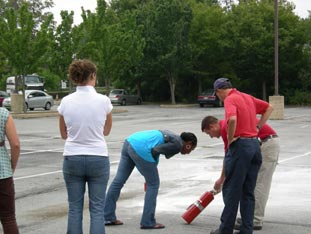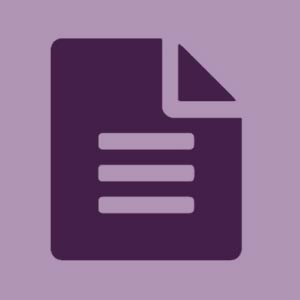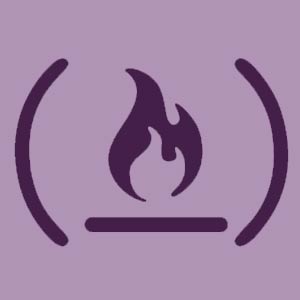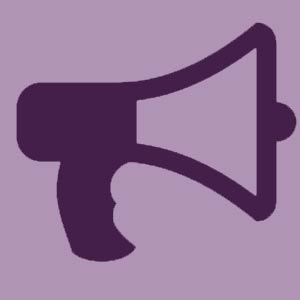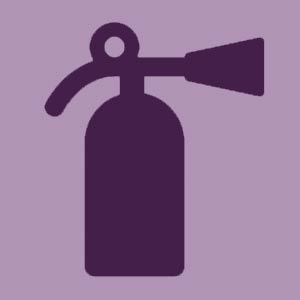Fire Safety
Fire Safety is responsible for:
- Conducting fire and life safety inspections
- Planning, monitoring and evaluating fire evacuation drills
- Maintaining fire detection and suppression systems
- Developing fire protection and prevention programs
- Conducting fire safety training
We are also responsible for providing professional services such as:
- Incident investigation
- Risk analysis
- Building plan review
- Regulatory code compliance.
On our site you will find useful information regarding seasonal fire safety tips, training opportunities for staff and students, evacuation guidelines, University Fire Safety statistics as well as applications forms and permits for fire safety related programs.
Fire Safety Training
Members of the WCU-EHS staff are available to provide fire safety hands-on training and informational seminars for any group interested in learning more on how to stay "Fire Safe." Contact the Office of Fire Safety (610-436-3315) for more information. Visit the Fire Extinguisher Training website for information on the use of portable fire extinguishers.
General Safety
West Chester University has established fire safety regulations for your protection. The following are general fire safety regulations you should be familiar with:
- No open flame devices are permitted in campus housing. This includes, but is not limited to, candles, wax warmers, incense, and space heaters.
- Smoking is strictly prohibited in all campus housing, as well as any campus building.
- Possessing or using unauthorized appliances and heaters is prohibited.
- Reporting false alarms, tampering with fire alarm devices or otherwise threatening the life safety of the members of the community is prohibited.
- Appliances used for food preparation (hot plates, toasters, toaster ovens, indoor or outdoor grills, coffee makers, hot oil poppers, etc) are prohibited in North Campus Residence Hall rooms. They are considered serious fire hazards and can produce odors that the building's ventilation system can not handle. You may find food preparation appliances and a microwave at your residence hall front desk or in your residence hall kitchen. Microwaves are also allowed in student rooms, but may not be any larger than 0.7 cubic feet. Coffee makers with an exposed hot plate are prohibited; single-cup coffee makers (without an exposed hot plate) are permitted.
- Each room or apartment is provided with a Safe-T-sensor™ microwave fire safety device that must be used on microwave ovens. The Safe-T-sensor™ is designed to prevent microwave cooking fires. This device is property of the University and must remain in the room or apartment or turned in at check-out as instructed by the Residence Life and Housing Services staff.
- The storage of combustible and flammable materials such as propane tanks, lighter fluid, gasoline, turpentine (and other similar art supplies) is prohibited in all housing facilities.
- Breaking and/or removing screens and screen seals from windows and disposing of any item from a window is prohibited.
- Athletic activity which could cause harm or disruption to residents and building facilities/fire protection systems is prohibited (i.e. throwing, kicking or bouncing balls, playing hockey, etc).
- Each student in University-owned facilities is provided with a Fire Shield™ surge protector electrical outlet strip/extension cord for use in their room or apartment. The only surge protector or extension cords permitted for use in University-owned facilities are Fire Shield™ branded products. This surge protector is property of the University and must remain in the room or apartment or turned in at check-out as instructed by the Residence Life and Housing Services staff.
Students found in violation of these regulations are subject to disciplinary and possible criminal action.
In Case of Fire
In the event of a fire or other situation requiring evacuation and notification of emergency services personnel, please follow these directions:
- Sound the fire alarm by activating the nearest manual pull station.
- Move swiftly to the nearest emergency exit, remembering not to use the center stairwell unless absolutely necessary.
- Call Public Safety (610-436-3311) once in a safe place to report the emergency.
- DO NOT re-enter the building for any reason.
Fire Drills
In compliance with state regulations, fire drills are conducted at varying times on a monthly basis in all residence halls and apartments. The participation of ALL occupants of on-campus housing is required. Please follow these procedures:
- Become familiar with the fire exits nearest your room and the evacuation plans posted on each floor of your building. Generally speaking, you should use the closest fire tower to your room, but you should also be aware of a secondary exit in the event your primary exit becomes unusable.
- DO NOT use the center stairwells in the event of an emergency. These stairwells must be kept clear for emergency services personnel.
- Exit the building swiftly. Do not run, but walk briskly to the nearest exit. Remain calm.
- After exiting the building, report to your pre-designated meeting location (determined at the beginning of each school year). Apartment residents cannot remain in any external stairwells or complex courtyards.
- DO NOT leave your meeting location or re-enter your residence hall unless instructed to do so by university officials.
- DO NOT use the elevators.
Fire Detection and Protection
All buildings are equipped with fire alarm systems including smoke detectors and automatic sprinkler systems. Residence halls have several manual pull stations on each floor. The South Campus Apartments have manual pull stations in each apartment, and the Village has manual pull stations in the exterior stairwells of each building.
Automatic Sprinkler System Facts
- The sprinkler systems installed in the residence halls are "wet-pipe" sprinkler systems. This means that there is water throughout the pipes in the system right up to each sprinkler head.
- Sprinkler heads are heat sensing devices. They are set to activate once the area around the sprinkler reaches a predetermined temperature. Sprinkler heads do not sense smoke.
- Each sprinkler head operates individually. In other words, the activation of one sprinkler head will not cause the entire system to operate.
- While all systems vary by design, a typical sprinkler head will discharge approximately 15-30 gallons of water per minute, under pressure. In addition, most residence hall sprinkler systems have fire pumps to boost the water pressure on the system, so water discharging from a sprinkler head will accumulate quickly and cause significant flooding.
- After sprinkler activation, it may take an additional 15-20 minutes for the residual water to drain out of a system after the valve is closed, causing even further water damage.
Things to Avoid
- Never hang on sprinkler pipes, and never hang anything on a sprinkler head. Tampering with sprinkler pipes and sprinkler heads can cause significant flooding and water damage. More importantly, however, this will cause impairment and reduces its ability to protect the building and its occupants in the event of a fire.
- Keep the area around each sprinkler head clear for a minimum of 18 inches, including closet shelves. Obstructions to sprinkler heads will reduce their effectiveness in the event of a fire.
- Never tamper with any fire protection equipment or block any fire protection devices inside or outside the buildings.
- Do not cover or otherwise obstruct sprinkler heads, smoke detectors, or other fire detection and suppression equipment.
- Do not open windows in stair towers during the winter months. Some stair towers are not heated well enough to prevent water from freezing in the pipes. This can cause leaks and flooding from broken pipes.
The automatic sprinkler systems and fire detection systems installed in the residential facilities are there for your protection. Do not tamper with them or use them for any other purpose. Your cooperation is needed to help insure that, if needed, these systems will operate as designed.
Documents
- Training Programs & Procedures
- Fire Safety Programs
- Permits
- Employee and Student Information
Additional Resources

